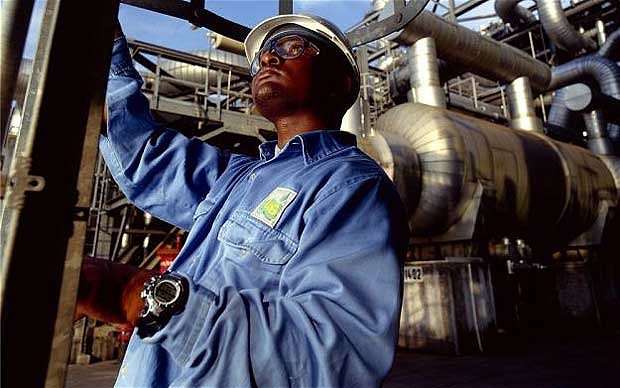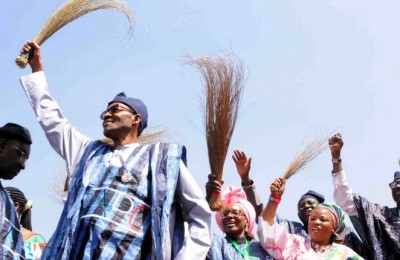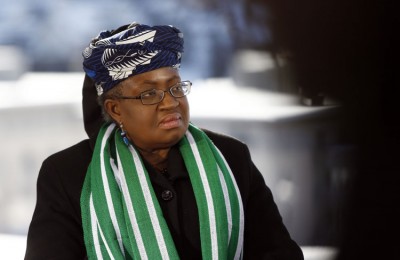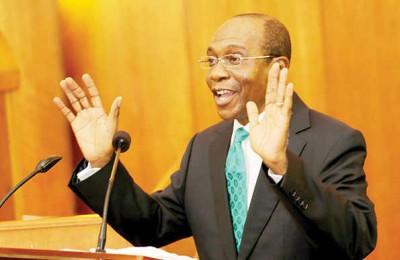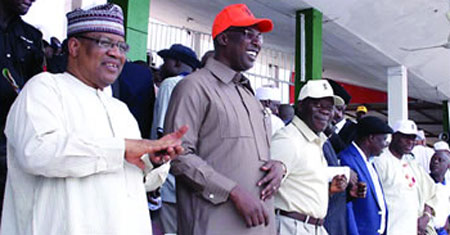A forensic audit report by PricewaterHouseCoopers (PWC) on Nigeria ‘missing’ oil money shows that government agencies in charge of handling crude oil revenues are disfunction and lack reputable operating system for managing relevant accounts.
The report published in February 2015 was launched following allegation by former Nigerian Central Bank, Lamido Sanusi - now the emir of the northern city of Kano - that $20bn (£13.13bn) could not be accounted for by the Nigerian National Petroleum Corporation (NNPC).
Although the report failed to support Lamido Sanusi claims of the missing money, it however criticized NNPC and other government agencies over conflicting interests, for using data that are inaccurate and of significant discrepancies.
“The accounting and reconciliation system for crude oil revenues used by all Government agencies appears to be inaccurate and weak,” the report stated. “We noted significant discrepancies in data from different sources. The lack of independent audit and reconciliation led to over reliance on data produced from NNPC which may not necessarily be accurate. This matter is further compounded by the lack of independence within NNPC as the business has conflicting interests of being a stand-alone selffunding entity and also the main source of revenue to the Federation account.”
The Goodluck Jonathan administration had refused to made public the report until recent when the President-elect Muhammadu Buhari publicly said that he will investigate the ‘missing’ oil money. “Imagine a situation where the former CBN (Central Bank of Nigeria) governor, who by God’s grace, is now the emir of Kano, raised an issue of missing billions of money, not in naira but in dollars, $20 billion,… instead of investigating whether it was true, they simply found a reason to remove him,” he said.
Following Buhari’s statement, Nigeria’s Petroleum Resources minister Diezani Alison-Madueke announced that $1.4bn would be refunded to federation account based on PWC audit.
It remains unclear whether the incoming president will launch another investigation to address discrepancies revealed by the report.
Pedro Omontuemhen, PWC Audit Engagement Leader, had stated in a letter written to the Office of the Auditor-General for the Federation on February 2, 2015 that the audit report couldn’t meet the desirable standards because of unreliable data provided relevant agencies.
“The procedures we performed did not constitute an examination or a review in accordance with generally accepted auditing standards or attestation standards. Accordingly, we provide no opinion, attestation or other form of assurance with respect to our work or the information upon which our work was base,” he said.
Key findings from the audit report:
- Total gross revenues generated from FGN crude oil liftings was $69.34bn and NOT $67 billion as earlier stated by the Reconciliation Committee for the period from January 2012 to July 2013.
- Total cash remitted into the Federation accounts in relation to crude oil liftings was $50.81bn and NOT $47bn as earlier stated by the Reconciliation Committee for the period from January 2012 to July 2013.
- NNPC has provided information on the difference leading to a potential excess remittance of $0.74 billion (without considering expected remittances from NPDC). Other indirect costs of $2.81billion which were not part of the submission to the Senate Committee hearing have been defrayed to arrive at this position.
- The resulting potential excess remittance indicates that the Corporation operates an unsustainable model. Forty six percent (46%) of proceeds of domestic crude oil revenues for the review period was spent on operations and subsidies. The Corporation is unable to sustain monthly remittances to the Federation Account Allocation Committee (FAAC), and also meet its operational costs entirely from the proceeds of domestic crude oil revenues, and have had to incur third party liabilities to bridge the funding gap. Furthermore, the review period recorded international crude oil prices averaging $122.5 per barrel (Average Platts prices for 2012). As at the time of concluding this report, international crude oil prices average about $46.07 per barrel2 , which is about sixty two percent (62%) reduction when compared to the crude oil prices for the review period. If the NNPC overhead costs and subsidies are maintained (assuming crude oil production volumes are maintained), the corporation may have to exhaust all the proceeds of domestic crude oil sales, and may still require third party liabilities to meet costs of operations and subsidies, and may not be able to make any remittances to FAAC.
- We therefore recommend that the NNPC model of operation must be urgently reviewed and restructured, as the current model which has been in operation since the creation of the Corporation cannot be sustained.
- The report reflects the fact that $3.38 billion was spent on DPK subsidy for the review period. We also confirmed using third party vessel tracking platforms that all vessels carrying NNPC cargoes arrived in Nigeria within the periods disclosed by PPPRA.
- A major consideration centers on the ownership of oil and gas assets controlled by NPDC. Subject to additional information being provided, we estimate that the NNPC and NPDC should refund to the Federation Account a minimum of $1.48billion as summarised in the next page.
- A determination is required as to whether all or a portion of ‘other costs not directly attributable to crude oil operations can be defrayed by NNPC.
Timeline of allegations according to PWC audit report:
“The assignment follows a timeline of events beginning with a letter in September 2013 by the former Governor of CBN, HRH Mallam Sanusi Lamido Sanusi to the President of the Federal Republic of Nigeria, Dr Goodluck Ebele Jonathan (GCFR) stating (among other allegations), that from January 2012 to July 2013, NNPC had lifted $65bn worth of crude on behalf of the FGN but remitted only $15bn, with $49.8bn outstanding.”
25 September 2013
Sanusi Lamido Sanusi, former CBN Governor, writes a letter to the President stating that from January 2012 – July 2013, NNPC had lifted $65bn worth of crude on behalf of the FGN but remitted only $15.2bn, thus $49.8bn was outstanding.
13 December 2013
The former GMD NNPC (Andrew Yakubu) responds that no money is missing. A revenue reconciliation meeting was set up by the FGN to look into the allegations. The meeting had representatives from:
i) CBN
(ii) NNPC
(iii) Department of Petroleum Resources (DPR)
(iv) Federal Inland Revenue Service (FIRS)
(v) Office of the Accountant General of the Federation (OAGF)
(vi) The Budget Office of the Federation
(vii) Federal Ministry of Finance
(viii) Federal Ministry of Petroleum Resources.
18 December 2013
After the reconciliation meeting, a joint press statement was issued by all the parties as follows: Actual value of crude lifted over the period was $67bn which was accounted for as follows: (i) Revenues which directly accrued to NNPC (for the Federation Account) of $14bn
(ii) Additional revenues lifted by NNPC on behalf of other parties as follows: - FIRS ($15bn) - DPR ($2bn) - NPDC ($6bn) - Other third party financing ($2bn)
(iii) Domestic crude lifted by the NNPC ($28bn)
The Ministry of Finance acknowledged that all crude lifted was remitted apart from domestic crude remittances with a shortfall of $10.8bn, made up of:
i)Unpaid subsidy claims – USD 8.77billion
(ii)Holding costs of strategic reserves – USD 0.46billion
(iii)Crude oil and product losses – USD0.76billion
(iv)Pipeline and management costs – 0.91billion
CBN Governor stated that the shortfall is $12bn because, of the $28bn due from the domestic crude, NNPC had only remitted $16bn. NNPC insisted that the shortfall is $10.8bn and the difference was due to $1.2bn subsidy payments it claimed to have made between Jan-Mar 2012 (relating to October – December 2011 discharges), and which had been certified by the PPPRA. CBN did not recognize it as no documents were provided by NNPC to support the explanation. Investigative Forensic audit of crude oil revenues and remittances by NNPC (January 2012 – July 2013) Confidential information for the sole benefit and use of the Auditor-General for the Federation.
4 February 2014
The CBN Governor appearing before the Senate Committee on Finance stated that NNPC needs to account for $20bn discounting some of the initial explanations provided by NNPC (the lifting in favour of NPDC, other third party financing and certified subsidy claims). The Governor stated that out of the $67billion worth of crude oil lifted by the NNPC, only $47billion had been appropriately accounted for as follows:
NNPC payment for FGN crude - $14bn
FIRS crude - $15bn
Domestic crude - $16bn
IOC payment(Royalty) - $2 bn
Total - $47bn
13 February 2014
The NNPC accounted for the $20bn shortfall as follows:
| S/N Description | $billion | |
| 1. NPDC | 6 | |
| 2. Other third party financing | 2 | |
| 3. Jan – Mar 12 certified subsidy | 1.2 | |
| 4. DPK subsidy | 3.5 | |
| 5. PMS subsidy | 5.25 | |
| 6. Crude oil product losses | 0.76 | |
| 7. Maintaining the strategic reserves | 0.46 | |
| 8. Pipeline maintenance and management costs | 0.91 | |
| Total | 20.08 |
The Minister of Finance and Coordinating Minister of the Economy, recommended that there should be an independent forensic audit of the amounts constituting the $10.8bn as stated on 18 December 2013.


